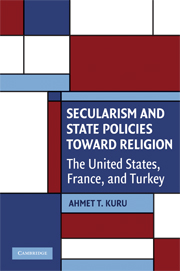Book contents
- Frontmatter
- Contents
- List of Figures and Tables
- Glossary of Abbreviations
- Acknowledgments
- Secularism and State Policies toward Religion
- Introduction
- 1 Analyzing Secularism
- PART I THE UNITED STATES
- PART II FRANCE
- 4 Assertive Secularism and the Multiculturalist Challenge (1989–2008)
- 5 The War of Two Frances and the Rise of Assertive Secularism (1789–1989)
- PART III TURKEY
- Conclusion
- Appendix A State-Religion Regimes Index of 197 Countries
- Appendix B Human Development and Official Religion in 176 Countries
- Appendix C State-Religion Regimes in Forty-Six Muslim Countries
- Appendix D Turkey's National Security Council Decisions, February 28, 1997
- Bibliography
- Index
4 - Assertive Secularism and the Multiculturalist Challenge (1989–2008)
Published online by Cambridge University Press: 05 June 2012
- Frontmatter
- Contents
- List of Figures and Tables
- Glossary of Abbreviations
- Acknowledgments
- Secularism and State Policies toward Religion
- Introduction
- 1 Analyzing Secularism
- PART I THE UNITED STATES
- PART II FRANCE
- 4 Assertive Secularism and the Multiculturalist Challenge (1989–2008)
- 5 The War of Two Frances and the Rise of Assertive Secularism (1789–1989)
- PART III TURKEY
- Conclusion
- Appendix A State-Religion Regimes Index of 197 Countries
- Appendix B Human Development and Official Religion in 176 Countries
- Appendix C State-Religion Regimes in Forty-Six Muslim Countries
- Appendix D Turkey's National Security Council Decisions, February 28, 1997
- Bibliography
- Index
Summary
In October 1989, the principal of a public high school in Creil (near Paris) expelled three Muslim female students because of their headscarves. The issue gained national importance because it could become a precedent for other schools. The Minister of Education, Lionel Jospin, declared that he supported a solution based on dialogue between school administrators and parents. Certain leftist and feminist intellectuals accused him of pursuing an appeasement policy and called for a general ban on wearing headscarves in schools. To shift the burden away from himself, Jospin applied to the Conseil d'Etat (Council of State). The Council issued an opinion, which emphasized that wearing a headscarf was not incompatible with laïcité (secularism).
The supporters of a general ban on headscarves did not give up, and the debate on the issue continued passionately for years. A survey of six major French and British newspapers between 1989 and 1999 shows that the number of articles on the headscarf issue in French newspapers reached 1,174, whereas the British newspapers carried only eighteen articles. The debate also raged in the courtrooms. The Council of State, the final appeals court on state-citizen cases in France, made case-by-case decisions on headscarves. Between 1992 and 1999, the Council overturned forty-one of the expulsion cases while upholding only eight of them. To overrule the Council of State, the supporters of a ban pressed for a new law on secularism.
- Type
- Chapter
- Information
- Secularism and State Policies toward ReligionThe United States, France, and Turkey, pp. 103 - 135Publisher: Cambridge University PressPrint publication year: 2009



